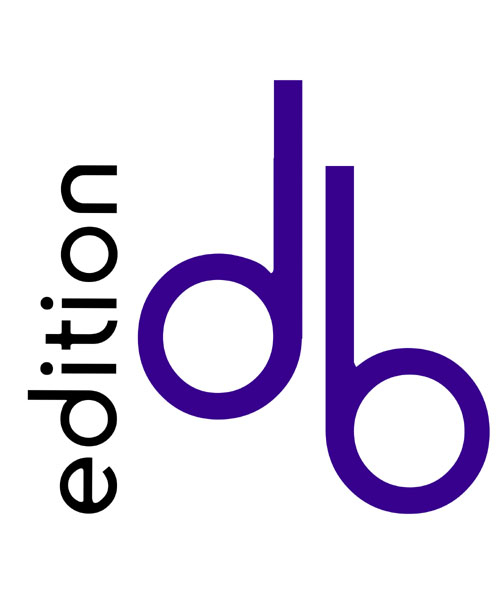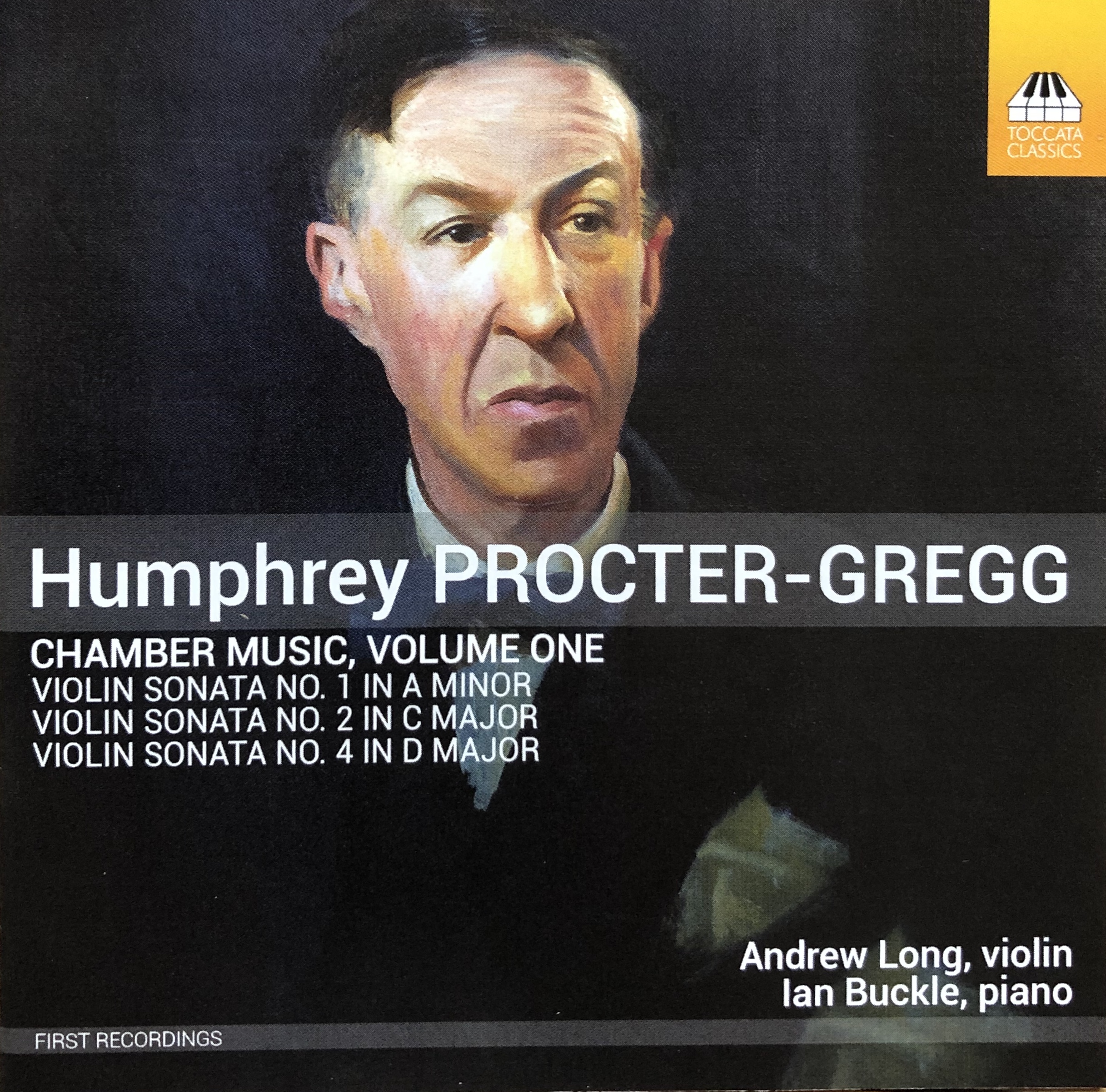
- 7 clarence grove
- horsforth
- leeds, LS18 4LA
- UK
- tel: 0113 258 1300
- order online
- order by fax
- www.editiondb.com
- 0113 258 2556
- info@editiondb.com
CD Review:
Humphrey PROCTER-GREGG (1895-1980)
- Violin Sonata No.1 in A minor (c.1934) [21:36]
- Violin Sonata No.2 in C major (c.1943) [28:07]
- Violin Sonata No.4 in D major (1969) [28:48]
- ________________________________________________________________
- Andrew Long (violin)
- Ian Buckle (piano)
- rec. 2018, Cosmo Rodewald Concert Hall, Manchester University
- TOCCATA CLASSICS TOCC0539 [78:35]
Academic and administrator, Humphrey Procter-Gregg was known more as a writer and translator than as a composer. He founded the Music Department of the University of Manchester and was later Director of the Carl Rosa opera Company. Though retirement in 1964 enabled him to compose full-time he had by no means neglected composition as a younger man, as this disc demonstrates.
It presents three of his violin sonatas. The Third is missing from this cycle but was recorded by Richard Howarth and Ian Buckle on Dutton Epoch CDLX7165. The First Sonata dates from the early to mid-1930s and was published in 1936. It was dedicated to Albert Sammons but was probably first performed by Henry Holst and R.J. Forbes. The idiom is very much in the Delius-Ireland bracket – right up Sammons’s street, of course – and suffused with elegant nostalgia, lyricism and even a dash of salon charm. The slow movement is, in effect, a Romance sans paroles, its tenderness rightly not indulged by the players, whilst the finale’s flighty personality is engaging. The sparring virtuosity of the duo spurs on ever more exuberant and intense writing before a triumphant end.
The Second Sonata followed around a decade later and was again probably premièred by the Manchester-based duo of Holst and Forbes. Toccata notes all these three works as being heard in first ever recordings and I’m sure that’s true for commercial purposes but I’d add a small footnote that it was privately recorded by Clifford Knowles, leader of the Liverpool orchestra, and Maurice Aitchison; both of them are mentioned by name as exponents of this work by Michael Almond and Robert Ashworth in their excellent booklet essay. I know because I once bid on this set in an auction catalogue but didn’t get it.
The opening shows a particular quality possessed by the composer for spinning especially lovely melodies, full of aerial grace. The blurb talks of a stylistic proximity to Fauré and this isn’t wide of the mark here, with a Delian admixture too. The central movement is a flighty scherzo, charmingly done, and the finale, the longest movement, allows both a long expressive panel and some faster writing. But Procter-Gregg has the courage to end his sonata quietly. The Fourth sonata of 1969 dates from his Lakeland retirement. There’s that companionable Delian ‘swing’ to the musical argument, and its partner, Fauréan piano writing – to put things crudely. The composer is unabashed at his profuse lyric generosity, or the sheer romantic reverie of the Andante, his songful liquidity. But he springs a surprise at the start of the finale, introducing a fugal element – not common practice in his sonatas, though he does so elsewhere – before a genial component enters the writing and sweeps all stern care aside.
Andrew Long was Assistant Leader of the Royal Liverpool Philharmonic but is now Acting Co-Leader of the Orchestra of Opera North. He is a subtle and deft player with a persuasively stylish approach to the repertoire and a fine tone. Ian Buckle is a concerto and ensemble player and clearly as attuned to the Francophile tendencies of some of Procter-Gregg’s writing as to its sturdier British qualities. This isn’t music to move mountains, but it does encapsulate a profound belief in the primacy of melodic beauty and in furthering the lineage of music both approachable and satisfying.
Jonathan Woolf
______________________________________
CD Review - July 2020
Source:
Humphrey Procter-Gregg: Violin Sonatas 1, 2 and 4 Andrew Long (violin), Ian Buckle (piano) (Toccata Classics)
Humphrey Procter-Gregg founded Manchester University’s Music Department, becoming its first Professor of Music in 1954. He studied at the RCM and at La Scala, was a close friend of Sir Thomas Beecham. While his conservative tastes didn’t endear him to all his students, he was a hugely influential figure in Manchester, designing the university’s concert hall and founding the Ad Solem Ensemble.
There’s a nice anecdote in this disc’s booklet about Procter-Gregg’s chance meeting with Rachmaninov in 1930, the two men sharing their dislike of contemporary music and bonding over a mutual love of tunes. Three of Procter-Gregg’s Violin Sonatas are collected here, each one an expansive three-movement work. They’re deceptively rich pieces, their salon-like surfaces concealing a wealth of harmonic and melodic ingenuity. You hear this at the outset of the Sonata No. 1 in A minor, the initially calm violin melody imperceptibly darkening within seconds. The finale’s changes of metre are effortlessly managed by violinist Andrew Long and pianist Ian Buckle, their conviction bringing the music to life. Sonata No. 2 is longer and more distinctive, the first movement's structural intricacies belied by the serene opening theme. There's a scherzando middle movement, the weighty finale carrying most of the sonata's emotional weight.
No. 4 dates from 1969 during Procter-Gregg's retirement in Windermere. The language is more chromatic and exploratory, the transitions between themes more subtly managed. There's a sublime Andante and a complex finale, the quiet closing bars highly affecting. This music deserves to be heard, and you can't imagine a more persuasive case being made for it. We get good notes, and it's fitting that the disc was recorded in the concert hall which the composer helped to create.
Graham Rickson
